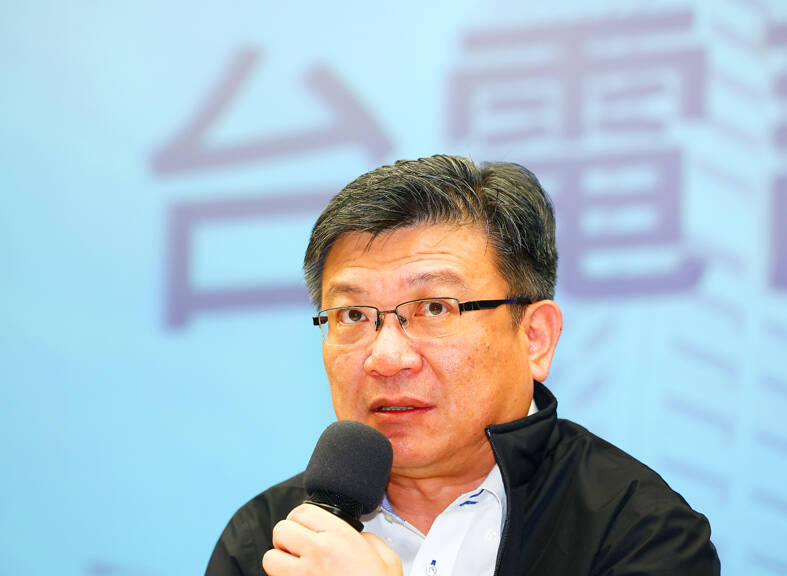State-run utility Taiwan Power Co (Taipower, 台電) yesterday said it was “highly possible” the company could turn its financial situation around this year after reporting profits from May on the back of lower fuel costs.
The New Taiwan dollar’s appreciation against the US dollar and higher summer electricity rates also boosted the company’s bottom line, Taipower chairman Tseng Wen-sheng (曾文生) said.
Electricity rates are about 20 percent higher on average during the summer, while power consumption usually soars 40 percent over other seasons because of higher temperatures, Taipower data showed.

Photo: CNA
Revenue rose 16 percent year-on-year in the first half of this year to NT$409.3 billion (US$13.44 billion), while fuel costs fell about 7 percent, the company said.
Net losses narrowed sharply to NT$15.5 billion from NT$60.2 billion a year earlier, and the firm’s gross margin improved to 0.15 percent from minus-11.87 percent, company data showed.
That was the first time in about four years that Taipower’s gross margin returned to positive territory.
The figures suggest that “it is highly possible for the company to break even this year,” Tseng said.
What remains at stake is resolving Taipower’s accumulated losses of more than NT$400 billion, which would require government subsidies to clear, he added.
Despite the improvement to its bottom line, it is unclear if Taipower would again freeze electricity rates in October after it kept rates unchanged in April.
The company is slated to review rates next month, with any adjustments to be determined by the government’s electricity price review committee, Taipower spokesman Tsai Chih-meng (蔡志孟) said.

In Italy’s storied gold-making hubs, jewelers are reworking their designs to trim gold content as they race to blunt the effect of record prices and appeal to shoppers watching their budgets. Gold prices hit a record high on Thursday, surging near US$5,600 an ounce, more than double a year ago as geopolitical concerns and jitters over trade pushed investors toward the safe-haven asset. The rally is putting undue pressure on small artisans as they face mounting demands from customers, including international brands, to produce cheaper items, from signature pieces to wedding rings, according to interviews with four independent jewelers in Italy’s main

Japanese Prime Minister Sanae Takaichi has talked up the benefits of a weaker yen in a campaign speech, adopting a tone at odds with her finance ministry, which has refused to rule out any options to counter excessive foreign exchange volatility. Takaichi later softened her stance, saying she did not have a preference for the yen’s direction. “People say the weak yen is bad right now, but for export industries, it’s a major opportunity,” Takaichi said on Saturday at a rally for Liberal Democratic Party candidate Daishiro Yamagiwa in Kanagawa Prefecture ahead of a snap election on Sunday. “Whether it’s selling food or

CONCERNS: Tech companies investing in AI businesses that purchase their products have raised questions among investors that they are artificially propping up demand Nvidia Corp chief executive officer Jensen Huang (黃仁勳) on Saturday said that the company would be participating in OpenAI’s latest funding round, describing it as potentially “the largest investment we’ve ever made.” “We will invest a great deal of money,” Huang told reporters while visiting Taipei. “I believe in OpenAI. The work that they do is incredible. They’re one of the most consequential companies of our time.” Huang did not say exactly how much Nvidia might contribute, but described the investment as “huge.” “Let Sam announce how much he’s going to raise — it’s for him to decide,” Huang said, referring to OpenAI

The global server market is expected to grow 12.8 percent annually this year, with artificial intelligence (AI) servers projected to account for 16.5 percent, driven by continued investment in AI infrastructure by major cloud service providers (CSPs), market researcher TrendForce Corp (集邦科技) said yesterday. Global AI server shipments this year are expected to increase 28 percent year-on-year to more than 2.7 million units, driven by sustained demand from CSPs and government sovereign cloud projects, TrendForce analyst Frank Kung (龔明德) told the Taipei Times. Demand for GPU-based AI servers, including Nvidia Corp’s GB and Vera Rubin rack systems, is expected to remain high,